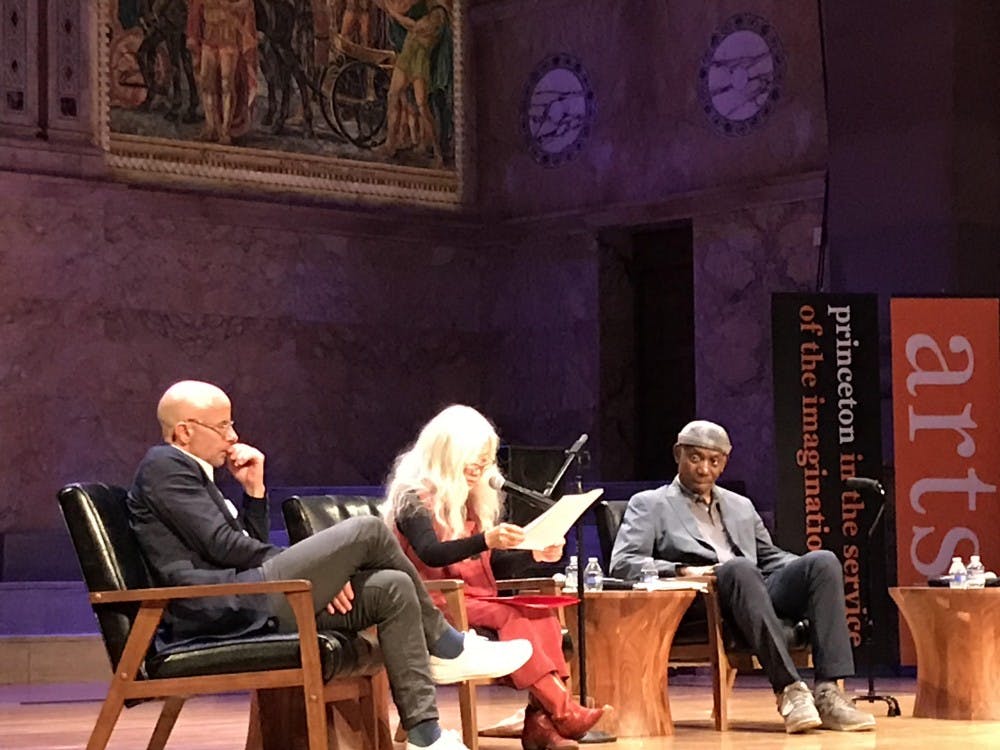The Program in Creative Writing started off this year’s Althea Ward Clark Reading Series and the celebration of the 80th year of the program with a reading featuring distinguished authors Maxine Hong Kingston, Yusef Komunyakaa, and David Treuer ’92.
The writers read excerpts of their writing for a crowd of about 100 audience members, including students, professors, and local community members, in Richardson Auditorium on Wednesday, Sept. 25.
Writer Paul Muldoon introduced Jhumpa Lahiri, the new Director of the Program in Creative Writing, who proceeded to introduce the evening’s speakers.
In her introduction, Lahiri spoke of each of the authors’ ties to the University. Treuer graduated from the University in 1992 and took classes in creative writing during his time on campus. Komunyakaa taught in the program for a decade. While Kingston holds no such personal link to the University, Lahiri spoke of the profound impact of her writing on campus life.
“Maxine Hong Kingston has not studied or taught at this university, but in being studied here, in being taught, she too is a member of this intellectual community. ‘The Woman Warrior,’ her groundbreaking debut, was published in 1973, the same year that Princeton conferred degrees on its first coeducational undergraduate class,” Lahiri said. “By now it goes without saying that Kingston was the harbinger for the certificate program in Asian-American studies, approved at long last by the University just one year ago.”
According to Lahiri, each of the featured writers have used their writing in the pursuit of justice and redefining historical narratives.
“Each has pushed against dominant historical narratives, addressing ellipses, misreadings, misrepresentations,” she said. “Each has revised and further complicated the ever-evolving and open-ended definitions of what it might mean to be an African American, a Chinese American, a Native American. In doing so, each has empowered and enlightened all Americans.”
Treuer, an Ojibwe Indian who grew up on a reservation in Minnesota, explained that he traces elements of his career to his time as an undergraduate. He referenced his experience reading Dee Brown’s book, “Bury My Heart at Wounded Knee,” which he described as the best-selling book about American Indians ever published, as well as a kind, sympathetic work about Native American history.

Treuer recalled his ambivalence upon reading Brown’s opening pages, which refer to the supposed death of Native American civilization.
“It was so complicated, coming across Dee Brown’s words so far from home,” Treuer said. “On one hand, I was so honored, to be honest, that someone of Dee Brown’s intelligence and compassion would devote so much of his life to telling my history. On one hand he’s lifting me up, and on the other hand he’s shoving me in a grave, with the rather premature announcement of our collective death.”
Treuer read from his book, “The Heartbeat of Wounded Knee: Native America since 1890,” which he hopes will nuance Brown’s dismal assessment of Native American history.
“This book is an attempt to dismantle that narrative and to try to create some sort of counternarrative,” he said. “This book is written out of the simple, fierce conviction that our cultures are not dead, and our civilizations have not been destroyed. It is written with the understanding that our present tense is evolving as rapidly and creatively as everyone else’s.”

Komunyakaa chose to read various selections of his poetry without offering additional comment.








